The Intel 9th Gen Review: Core i9-9900K, Core i7-9700K and Core i5-9600K Tested
by Ian Cutress on October 19, 2018 9:00 AM EST- Posted in
- CPUs
- Intel
- Coffee Lake
- 14++
- Core 9th Gen
- Core-S
- i9-9900K
- i7-9700K
- i5-9600K
Gaming: Ashes Classic (DX12)
Seen as the holy child of DirectX12, Ashes of the Singularity (AoTS, or just Ashes) has been the first title to actively go explore as many of the DirectX12 features as it possibly can. Stardock, the developer behind the Nitrous engine which powers the game, has ensured that the real-time strategy title takes advantage of multiple cores and multiple graphics cards, in as many configurations as possible.
As a real-time strategy title, Ashes is all about responsiveness during both wide open shots but also concentrated battles. With DirectX12 at the helm, the ability to implement more draw calls per second allows the engine to work with substantial unit depth and effects that other RTS titles had to rely on combined draw calls to achieve, making some combined unit structures ultimately very rigid.
Stardock clearly understand the importance of an in-game benchmark, ensuring that such a tool was available and capable from day one, especially with all the additional DX12 features used and being able to characterize how they affected the title for the developer was important. The in-game benchmark performs a four minute fixed seed battle environment with a variety of shots, and outputs a vast amount of data to analyze.
For our benchmark, we run Ashes Classic: an older version of the game before the Escalation update. The reason for this is that this is easier to automate, without a splash screen, but still has a strong visual fidelity to test.
| AnandTech CPU Gaming 2019 Game List | ||||||||
| Game | Genre | Release Date | API | IGP | Low | Med | High | |
| Ashes: Classic | RTS | Mar 2016 |
DX12 | 720p Standard |
1080p Standard |
1440p Standard |
4K Standard |
|
Ashes has dropdown options for MSAA, Light Quality, Object Quality, Shading Samples, Shadow Quality, Textures, and separate options for the terrain. There are several presents, from Very Low to Extreme: we run our benchmarks at the above settings, and take the frame-time output for our average and percentile numbers.
All of our benchmark results can also be found in our benchmark engine, Bench.
| Ashes Classic | IGP | Low | Medium | High |
| Average FPS | 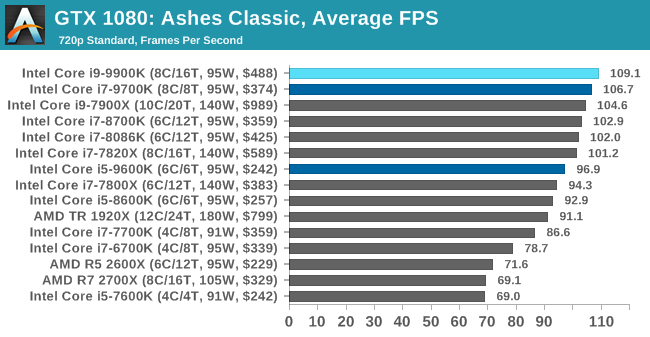 |
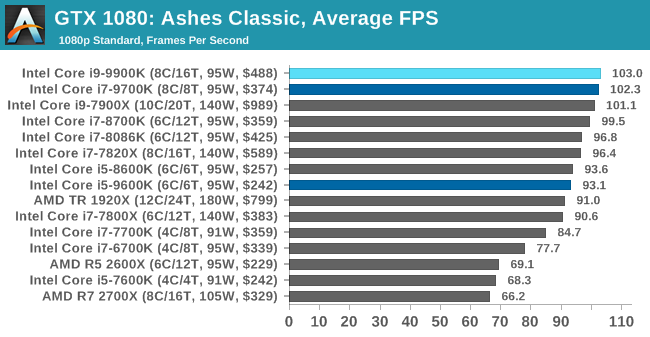 |
 |
 |
| 95th Percentile | 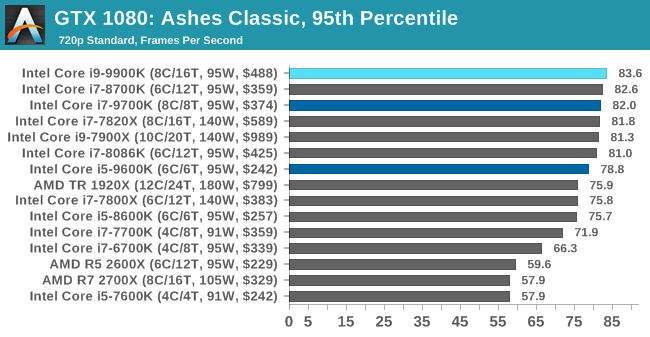 |
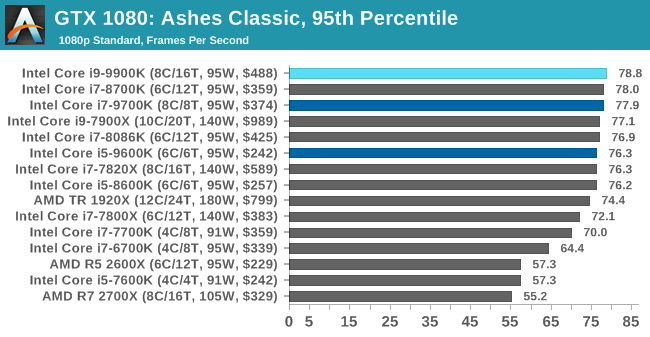 |
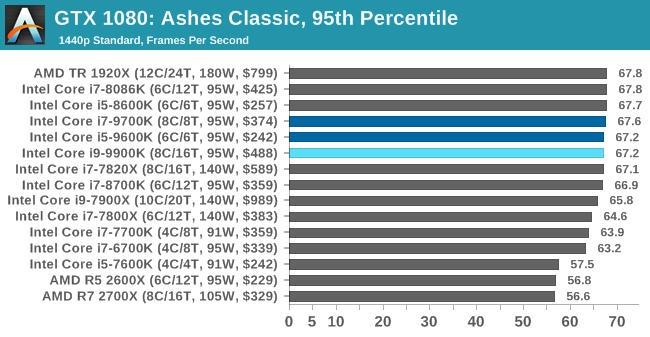 |
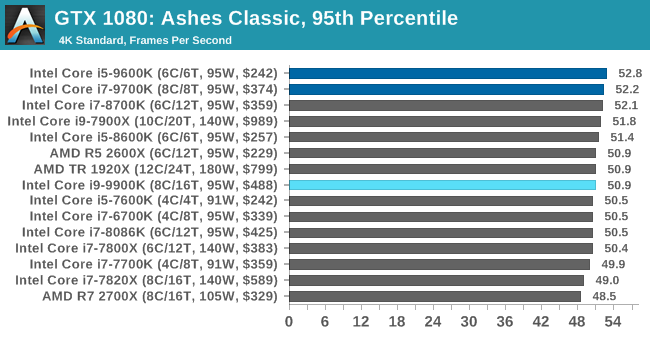 |
As a game that was designed from the get-go to punish CPUs and showcase the benefits of DirectX 12-style APIs, Ashes is one of our more CPU-sensitive tests. Above 1080p results still start running together due to GPU limits, but at or below that, we get some useful separation. In which case what we see is that the 9900K ekes out a small advantage, putting it in the lead and with the 9700K right behind it.
Notably, the game doesn’t scale much from 1080p down to 720p. Which leads me to suspect that we’re looking at a relatively pure CPU bottleneck, a rarity in modern games. In which case it’s both good and bad for Intel’s latest CPU; it’s definitely the fastest thing here, but it doesn’t do much to separate itself from the likes of the 8700K, holding just a 4% advantage at 1080p. This being despite its frequency and core count advantage. So assuming this is not in fact a GPU limit, then it means we may be encroaching on another bottleneck (memory bandwidth?), or maybe the practical frequency gains on the 9900K just aren’t all that much here.
But if nothing else, the 9900K and even the 9700K do make a case for themselves here versus the 9600K. Whether it’s the core or the clockspeeds, there’s a 10% advantage for the faster processors at 1080p.












274 Comments
View All Comments
evernessince - Saturday, October 20, 2018 - link
I'm sure for him money is a fixed resource, he is just really bad at managing it. You'd have to be crazy to blow money on the 9900K when the 8700K is $200 cheaper and the 2700X is half the price.Dug - Monday, October 22, 2018 - link
Relative to how much you make or have. $200 isn't some life threatening amount that makes them crazy because they spent it on a product that they will enjoy. We spend more than that going out for a weekend (and usually don't have anything to show for it). If an extra 200 is threatening to your lively hood, you shouldn't be shopping for new cpu's anyway.close - Saturday, October 20, 2018 - link
@ekidhardt: "I think far too much emphasis has been placed on 'value'. I simply want the fastest, most powerful CPU that isn't priced absurdly high."That, my good man, is the very definition of value. It happens automatically when you decide to take price into consideration the price. I also don't care about value, I just want a CPU with a good performance to price ratio. See what I did there? :)
evernessince - Saturday, October 20, 2018 - link
A little bit extra? It's $200 more then the 8700K, that's not a little.mapesdhs - Sunday, October 21, 2018 - link
The key point being, for gaming, use the difference to buy a better GPU, whether one gets an 8700K or 2700X (or indeed any one of a plethora of options really, right back to an old 4930K). It's only at 1080p and high refresh rates where strong CPU performance stands out, something DX12 should help more with as time goes by (the obsession with high refresh rates is amusing given NVIDIA's focus shift back to sub-60Hz being touted once more as ok). For gaming at 1440p or higher, one can get a faster system by choosing a cheaper CPU and better GPU.
There are two exceptions: those for whom money is literally no object, and certain production workloads that still favour frequency/IPC and are not yet well optimised for more than 6 cores (Premiere is probably the best example). Someone mentioned pro tasks being irrelevant because ECC is not supported, but many solo pros can't afford XEON class hw (I mean the proper dual socket setups) even if the initial higher outlay would eventually pay for itself.
What we're going to see with the 9900K for gaming is a small minority of people taking Intel's mantra of "the best" and running with it. Technically, they're correct, but most normal people have budgets and other expenses to consider, including wives/gfs with their own cost tolerance limits. :D
If someone can genuinely afford it then who cares, in the end it's their money, but as a choice for gaming it really only makes sense via the same rationale if they've also then bought a 2080 Ti to go with it, though even there one could retort that two used 1080 TIs would be cheaper & faster (at least for those titles where SLI is functional).
If anything good has come from this and the RTX launch, it's the move away from the supposed social benefit of having "the best"; the street cred is gone, now it just makes one look like a fool who was easily parted from his money.
Spunjji - Monday, October 22, 2018 - link
Word.Total Meltdowner - Sunday, October 21, 2018 - link
This comment reads like shilling so hard. So hard. Please try harder to not be so obvious.Spunjji - Monday, October 22, 2018 - link
I think they placed just the right amount of emphasis on "value". Your post basically explains why it's not relevant for you in terms of you being an Intel fanboy with cash to burn. I'll elaborate.The MSRP is in the realm of irrational spending for a huge number of people. "Rational" here meaning "do I get out anything like what I put in", wherein the answer in all metrics is an obvious no.
Following that, there are a HUGE number of reasons not to pre-order a high-end CPU, especially before proper results are out. Pre-ordering *anything* computer related is a dubious prospect, doubly so when the company selling it paid good money to paint a deceptive picture of their product's performance.
Your assertion that Intel have never launched a bad CPU is false and either ignorance or wilful bias on your part. They have launched a whole bunch of terrible CPUs, from the P3 1.2Ghz that never worked, through the P4 Emergency Edition and the early "dual-core" P4 processors, all the way through to this i9 9900K which is the thirstiest "95W" CPU I've ever seen. Their notebook CPUs are now segregated in such a way that you have to read a review to find out how they will perform, because so much is left on the table in terms of achievable turbo boost limits.
Sorry, I know I replied just to disagree which may seem argumentative, but you posted a bunch of nonsense and half-turths passed off as common-sense and/or logic. It's just bias; none of it does any harm but you could at least be up-front that you prefer Intel. That in itself (I like Intel and am happy to spend top dollar) is a perfectly legitimate reason for everything you did. Just be open and don't actively mislead people who know less than you do.
chris.london - Friday, October 19, 2018 - link
Hey Ryan. Thanks for the review.Would it be possible to check power consumption in a test in which the 2700x and 9900k perform similarly (maybe in a game)? POV-Ray seems like a good way to test for maximum power draw but it makes the 9900k look extremely inefficient (especially compared to the 9600k). It would be lovely to have another reference point.
0ldman79 - Friday, October 19, 2018 - link
I'm legitimately surprised.The 9900k is starving for bandwidth, needs more cache or something. I never expected it to *not* win the CPU benchmarks vs the 9700k. I honestly expected the 9700k to be the odd one out, more expensive than the i5 and slower than the 9900k. This isn't the case. Apparently SMT isn't enabling 100% usage of the CPU's resources, it is allowing a bottleneck due to fighting over resources. I'd love to see the 9900K run against it's brethren with HT disabled.